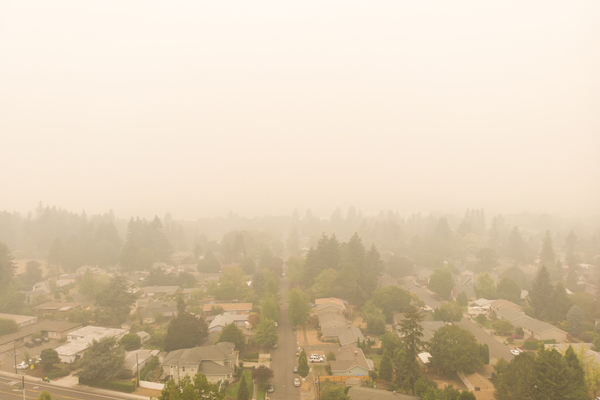Tens of millions of people in North America are dealing with dangerous air quality levels as intense wildfires continue to burn across Canada.
As BBC News reports, smoke has blanketed large areas of Ontario and Quebec, while an orange haze hung over much of the north-eastern US throughout Tuesday and into Wednesday. While much of the smoke is being generated from 160 wildfires burning in the Quebec region, a result of the fires, neighboring metropolis’s Toronto and New York briefly ranked among the metro areas with the worst air quality in the world overnight.
Canadian officials say the country is shaping up for its worst wildfire season on record. Experts have pointed to a warmer and drier spring than normal as the reason behind the trend, and these conditions are projected to continue throughout the summer.
Environment Canada issued its strongest air quality warning for Ottawa on Tuesday, deeming it a “very high risk” to people’s health. In Toronto and its surrounding areas, the air quality was classified as “high risk”. Deteriorating air quality has also forced at least one region in Quebec – the Atikamekw community of Opitciwan, 350km (217 miles) north of Montreal – to transfer people with asthma and other respiratory issues away from the smoke.
Meanwhile, the US Environmental Protection Agency (EPA) classified the air quality in much of the north-east as “unhealthy” especially for people with respiratory concerns. In total, some 100 million people around North America are thought to be under a form of air quality warning.
In New York, an orange haze blanketed the city’s skyline and shrouded landmarks including the Statue of Liberty. All outdoor activities at the city’s public schools have been indefinitely suspended, with Mayor Eric Adams warning that conditions are expected to deteriorate later on Wednesday. “We recommend all New Yorkers limit outdoor activity to the greatest extent possible,” he said. Local residents in the city said the smell of smoke by Tuesday evening was like a campfire.
On Wednesday morning, schools in the Washington DC area also cancelled outdoor activities as air quality levels were labelled “code red”, while Detroit was listed as the fifth worst major metropolitan area in the world on IQAir’s air pollution rankings. Public health officials have cautioned people not to exercise outside and to minimize their exposure to the smoke as much as possible, as the air poses immediate and long-term health risks.
Fires across Canada have already burned more than 3.3m hectares of land – an area 12 times the 10-year average for this time of year. Thousands of people have been evacuated across the country. In addition to Quebec, major fires have also been burning in British Columbia, Alberta, Ontario, Nova Scotia and the Northwest Territories in what’s on course to be a record year for wildfires across Canada.
Experts say exposure to wildfire smoke can cause a litany of health issues.
Matthew Adams, a professor at the University of Toronto and the director of its Centre of Urban Environments, said immediate effects of inhaling wildfire smoke include shortness of breath, an elevated pulse, chest pain, or inflammation in the eyes, nose and throat. “On these elevated air pollution days, we’ll see an increased number of visits to hospital,” Prof Adams told the BBC. “And the people that are visiting the hospital typically have a pre-existing respiratory disease.”
But wildfire smoke has also been linked to serious, long-term health issues like cancer or lung disease, Prof Adams said, specifically for people who live in areas that experience frequent forest fires. This is caused by small particles in the smoke haze, he said, which can enter the bloodstream and other parts of the human body, causing possible DNA mutations and other health issues.
Some studies have also shown that prolonged wildfire smoke exposure can affect pregnant women and their unborn children, Prof Adams added.
For people living in cities far away from the fires but under current air advisories, Prof Adams advised people limit outdoor exercise to avoid breathing in the wildfire smoke. “Don’t get so concerned about it,” he said. “Stay inside and reduce your exposure.” But in areas closer to the fires, Prof Adams recommended wearing an N95 mask outside to block inhalation of most of the smoke particles.
—
Photo Credit: Anton27 / Shutterstock.com
